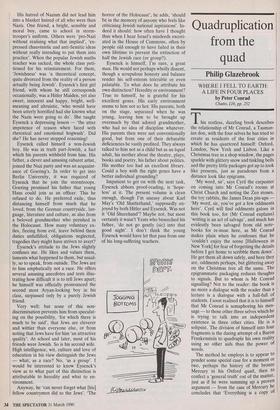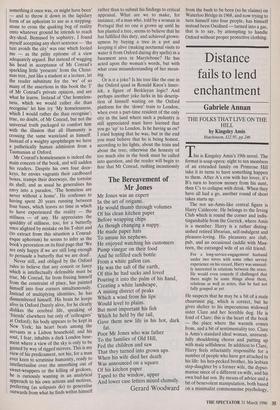Quadruplication from the quad
Philip Glazebrook
WHERE I FELL TO EARTH: A LIFE IN FOUR PLACES by Peter Conrad
Chatto, f16, pp. 252
his restless, dazzling book describes the relationship of Mr Conrad, a Tasman- ian don, with the four selves he has tried to create as residents of the four cities in which he has quartered himself: Oxford, London, New York and Lisbon. Like a Christmas tree in a shop window, the pages sparkle with glittery snow and tinkling bells and the pretty little packages got up to look like presents, just as paradoxes from a distance look like epigrams.
`My word, sir', says Cyril the carpenter on coming into Mr Conrad's rooms at Christ Church and noting the Zen stones, the toy rabbits, the James Dean pin-ups 'My word, sir, you've got a few oddments here'. Cyril will find oddments galore in this book too, for (Mr Conrad explains) `writing is an act of salvage', and much has evidently been salvaged from old note- books for re-issue here, as Mr Conrad makes plain when he confesses that he `couldn't enjoy the scene [Halloween in New York] for fear of forgetting the details before I got home to scribble them down'. He got them all down safely, and here they are, oddments perhaps, but glittering away on the Christmas tree all the same. The epigrammatic packaging reduces thoughts to signals. But to whom is Mr Conrad signalling? Not to the reader: the book is no more a dialogue with the reader than a lecture is a dialogue with a hall-full of students. I soon realised that it is to himself that Mr Conrad is semaphoring his mes- sage — to those other three selves which he is trying to talk into an independent existence in three other cities. He is a solipsist. The division of himself into four fragments is the daring attempt of a Baron Frankenstein to quadruple his own reality using no other aids than the power of words.
The method he employs is to appear to ponder some special case for a moment or two, perhaps the history of the bronze Mercury in his Oxford quad, then to confect a 'general truth' out of the matter, just as if he were summing up a proven argument — from the case of Mercury he concludes that 'Everything is a copy of
T
something it once was, or might have been' — and to throw it down in the lapidary form of an aphorism to use as a stepping- stone to cross the quaking bog of reality onto whatever ground he intends to reach dry-shod. Bemused by sophistry, I found myself accepting any short sentence — 'the taxi avoids the city' was one which fooled me — as the pithy epitome of a view adequately argued. But instead of wagging his head in acceptance of Mr Conrad's sparkling little 'presents' from the Christ- mas tree, just like a student at a lecture, let the reader substitute for the 'we' of so many of the assertions in this book the 'I' of Mr Conrad's private opinion, and see what he learns. Instead of 'Our homeless- ness, which we would rather die than recognise' let him try 'My homelessness, which I would rather die than recognise'; true, no doubt, of Mr Conrad, but not the universal truth packaged to comfort him with the illusion that all Humanity is crossing the same wasteland as himself. Instead of a weighty apophthegm we have a pathetically human admission from a Tasmanian at Oxford.
Mr Conrad's homelessness is indeed the main concern of the book, and will sadden his readers. Despite his own four door- keys, he envies vagrants their cardboard boxes, tramps their doorways, the tortoise its shell; and as usual he generalises his envy into a paradox, 'The homeless are never without a home'. He confesses to having spent 20 years running between four bases, which leaves no time in which to have experienced the reality — the stillness — of any. He appreciates the quiddity of stillness, too, for a butterfly once alighted by mistake on his T-shirt and (to extract from this situation a Conrad- esque aphorism) he seems to infer as the book's peroration on its final page that 'We are only happy if we are still long enough to persuade a butterfly that we are dead'. Never still, and obliged by the Oxford rules to believe that any conceit or fancy which is intellectually defensible must be true, Mr Conrad, far from freeing himself from the constraint of place, has painted himself into four corners simultaneously. Instead of multiplying identities, he has dismembered himself. His brain he keeps alive in Oxford (barely alive, for he clearly dislikes the cerebral life, speaking of friends' elsewhere but only of 'colleagues' at Oxford); his body appears to be kept in New York; his heart beats among the servants in a Lisbon household; and his soul, I fear, inhabits a dark London base- ment where a view of the sky is only to be gained by way of rigged mirrors. This is my view of his predicament, not his; for a man ever keen to scrutinise humanity, ready to intellectualise over the smoothing out of sweet-wrappers or the killing of geckoes, he is curiously wanting in an analytical approach to his own actions and motives, preferring (as solipsists do) to generalise outwards from what he finds within himself rather than to submit his findings to critical appraisal. What are we to make, for instance, of a man who, told by a woman in Portugal that no one is grown up until he has planted a tree, seems to believe that he has fulfilled this duty, and achieved grown- upness by buying a tree in a pot and keeping it alive (making nocturnal visits to water it from Oxford during dry spells) in a basement area in Marylebone? He has acted upon the woman's words, but with what crass misunderstanding of her mean- ing.
Or is it a joke? Is his tree like the one in the Oxford quad in Ronald Knox's limer- ick, a figure of Berkleyan logic? And perhaps another joke lurks in his descrip- tion of himself waiting on the Oxford platform for the 'down' train to London, when even a part-time resident of the only city in the land where such a pedantry is still appreciated must have learned that you go 'up' to London. Is he having us on? I tried hoping that he was, but in the end you must believe that he is being honest, according to his lights, about the train and about the tree; otherwise the honesty of too much else in the book must be called into question, and the reader will begin to fear that Mr Conrad, rushing incautiously from the bush to be born (so he claims) on Waterloo Bridge in 1968, and now trying to turn himself into four people, has himself instead been Oxidised — turned into a gas, that is to say, by attempting to handle Oxford without proper protective clothing.



























































 Previous page
Previous page